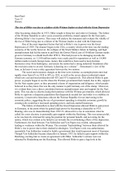Raul 1
Raul Patel
Year 13
History
The rise of Hitler was due to a failure of the Weimar leaders to deal with the Great Depression
After becoming chancellor in 1933, Hitler sought to bring law and order to Germany. The failure
of the Weimar Republic to solve socio-economic problems created support for the Nazi party,
allowing Hitler’s rise to power. This essay will analyse the statement and evaluate the validity of
the rise of Hitler being due to a failure of the Weimar leaders to deal with the Depression.
One of the most important factors that led to Hitler’s rise to power was the Great
Depression of 1929. The disaster began in the USA; a country which at the time was the leading
economy of the world, however, the collapse of the Stock Market, failure in banking, and high
unemployment had led the nation to pull back the Dawes Plan (Loan of 50 billion German marks
given to Germany to rebuild itself after WW1). This had proven to be damaging towards the
German economy, as 11,100 million marks were yearly paid for reparations as well as 18,000
million marks towards foreign loans, money that could have been used to keep German
businesses away from bankruptcy, and ensure the nation had a strong industrial foundation after
the recession came to an end. Germany is dancing on a volcano” – Stresemann’s view of the
loan, as he knew it was a risky agreement between the two nations.
The social and economic changes at the time were extreme, as unemployment rates had
rapidly risen from 6% in 1928 to 30% in 1932, as well as the severe drop in industrial output
which saw coal and steel production fall 42% and 51% respectively. This allowed Hitler to gain
power, as people began to see the chaos the Weimar government had created, due to this, support
for the Nazi regime grew, as they presented a factor of organisation and diligence, which people
believed in as they knew this was the only manner to pull Germany out of the slump. Moreover,
it is evident there was a direct correlation between unemployment rates and support for the Nazi
party. This was due to citizens losing their patience with the Weimar government, which allowed
Hitler to captivate a desperate population that desperately needed law and order to re-stabilise its
economy. Conservative historians criticize the Weimar Republic for not intervening in the
economic policy; suggesting the use of government spending to stimulate economic growth by
creating jobs would have increased spending power, and kick-started businesses.
The failure of chancellors to deal with the Great Depression allowed Hitler to gain power
in Germany, to the point where he gained legal power by becoming a chancellor in 1933.
Bruning, who was in chancellorship from 1932-33, allowed for a rise in extremists when he
called for a new election; to personally gain support within the Reichstag. This was unsuccessful,
as he was heavily criticised for using his position for personal benefit, and not caring for the
nation, which was evident as he failed to act towards the overwhelming effects of the depression.
Furthermore, the feud between Von Schleicher and Von Papen was evident, subsequently
leading to weakness within the Weimar. The constant “backstabbing” between them allowed for
Hitler’s rise to power due to their clashed in ideologies. Von Papen’s rule was authoritarian,
meanwhile Von Schleicher wanted to build a government that would represent most of Germans.
Though Von Schleicher became chancellor in January 1933, he failed to gain support within the
Reichstag, inciting him to create an agreement with Hitler. Schleicher’s actions were not
tolerated by Hindenburg nor the Reichstag. This allowed Hitler to gain a legal role in the





